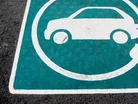Ride-hailing unicorn Didi Chuxing to develop network of electric vehicle charging stations

Didi Chuxing, Chinese ride-hailing Unicorn and the biggest player in its market in the country, is planning to develop its own network of charging stations for electric vehicles.
Did claims to have 450mn users and 21mn drivers worldwide, and its global fleet includes over 260,000 electric vehicles.
This was announced at today’s sustainable energy summit in Beijing, sponsored by the UN and the Global Energy Interconnection Development and Cooperation Organisation (GEIDCO).
See also:
Tesla to open new factory in Shanghai
Baidu to launch self-driving bus in China
Business Review Asia - November edition now live!
CEO and founder Cheng Wei said at the summit: “Didi’s charging networks will not only cover our own fleet… it will also serve families and the public.”
The charging system points will be built through joint venture projects. GEIDCO, which is based in Beijing and promotes sustainable energy use on a global scale, will invest as a key partner in the first joint venture.
The first project to take place will be “Orange Energy” which will map existing charging stations in cities and display them on the Didi driver’s app. According to Tech in Asia, this will first be rolled out in pilot cities before being expanded across China, and will subsequently offered to other users outside DID’s driver network.
As the largest car market in the world, and since promising to exclusively produce hybrid and electric car in coming years, China presents a growing opportunity for providers of electric vehicles and the necessary charging stations for them to run. Also, measures to decrease pollution and congestion will benefit the ride-hailing industry.
In 2016, around 500,000 hybrids and EVs were sold in China, which was four times as many as the US, the second-largest car market in the world.
There are around 300,000 charging points for electric vehicles in the country at present but these are largely less efficient that Didi’s are intended to be.
By 2020, Didi aims to increase its EV fleet from 260,000 to one million. The firm is also forming partnerships with some local governments with the aim of easing congestion in highly populated areas.
- Sustainability shapes the future of conferences and eventsSustainability
- ISG Report: Hybrid work is the future for AustraliaHuman Capital
- Beijing Olympic Stadium Renovation to be complete by OctoberSustainability
- DiDi Chuxing raises USD$500mn for AI driving subsidiaryLeadership & Strategy



